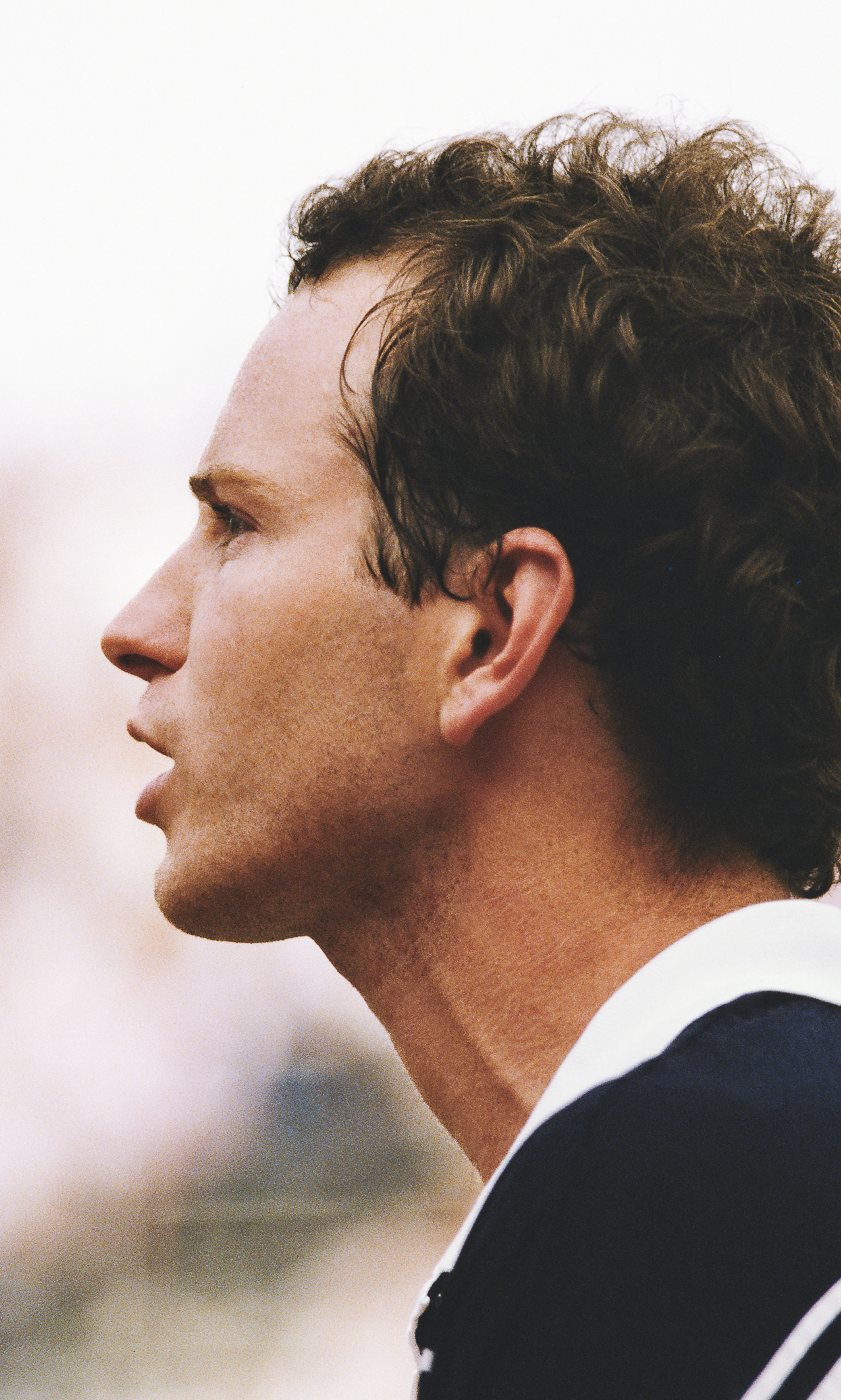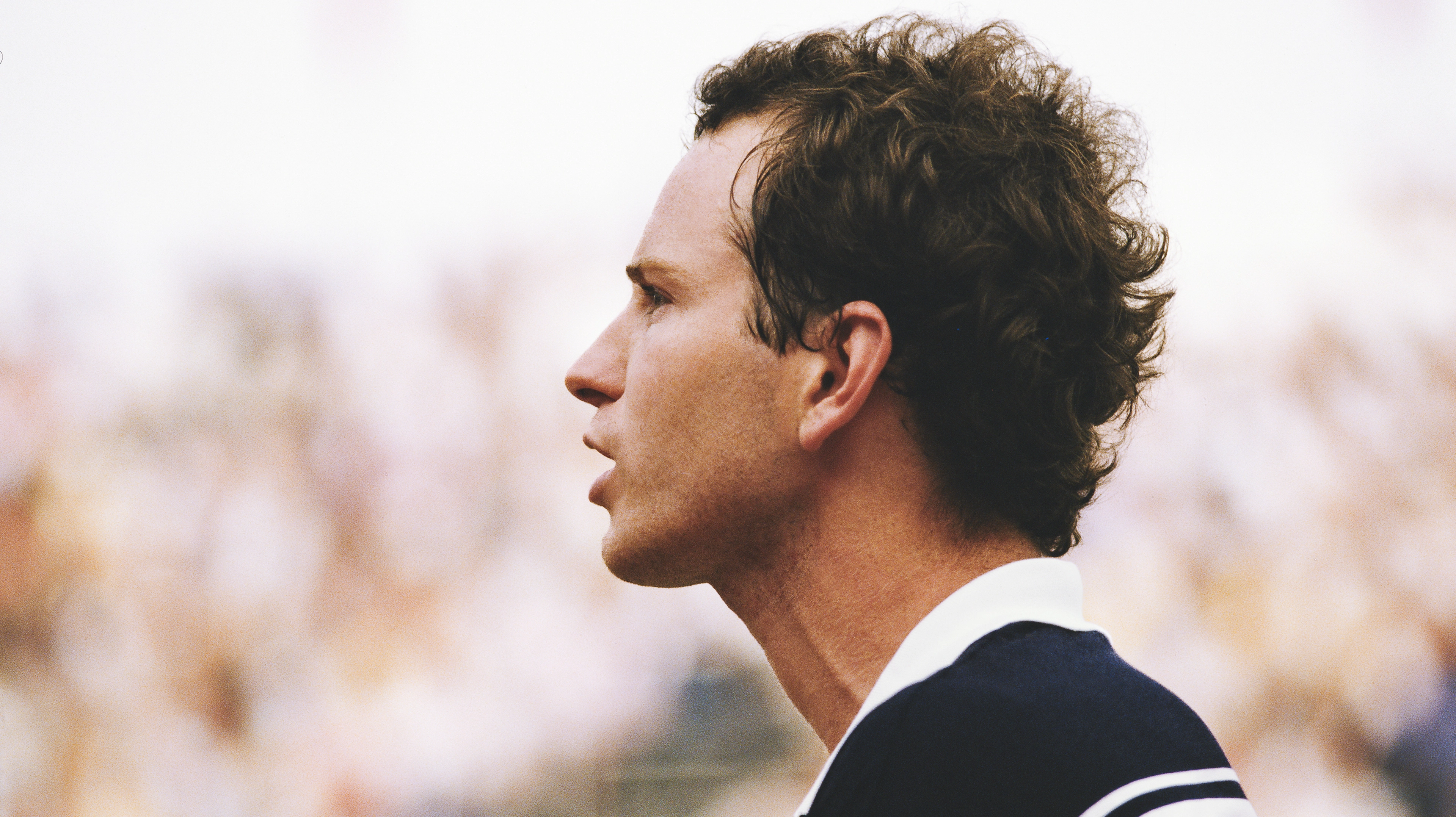The athlete's voice


- 12 July 2022
By Adam Bradley
What does 50 years of Nike sound like? Footfalls on polyurethane tracks. The echoed pop of optic yellow balls against nylon strings. The squeak of rubber soles on polished courts. Above all, though, Nike sounds like its athletes. In the early years, you could pick out each voice: Steve Prefontaine, Joan Benoit Samuelson, George "The Iceman" Gervin. As the decades went by, the voices grew louder, more varied: John McEnroe, Bo Jackson, Michael Jeffrey Jordan. Then Tiger, Serena, LeBron. Ronaldo, Mbappé, Naomi. With each passing decade, the chorus builds until their voices harmonise, united and distinct.
Nike listens. As John Slusher, the company's executive vice president for Global Sports Marketing, says, "Listening to the voice of the athlete is so crucial to us". Slusher and his team spend a great deal of time responding to—even anticipating—athletes' needs. A rising WNBA star like Sabrina Ionescu might require different things than an 18-year veteran like Diana Taurasi. Maybe it's business mentoring or a visit to the Sports Research Lab for a custom shoe fitting. Almost any athlete will appreciate a therapeutic massage, but for a 10,000-metre runner like Shalane Flanagan, a mid-heat massage could mean that one-second difference between qualifying for the final or going home.
"Listening to the voice of the athlete is so crucial to us".
John Slusher, EVP for Global Sports Marketing

Yes, Nike listens. And with listening comes learning: how to enhance performance, how to build a better business, how to respond to what the moment demands. With learning comes growth: improving not only products but also practices, supporting athletes as they take stands for social justice, centring the voices of women in sport and in business. With growth comes commitment, born of deep investment into the people and the principles that define the company. And with that commitment comes a familial bond between Nike and its athletes. Slusher often stresses himself out while watching major sporting events. Why? "If it's two Nike teams or Nike athletes on opposing sides", he says, "I practically have to look away. Nike in general and our teams—we love our athletes, we love our sports".
Over the years, Nike's athletes have reciprocated that commitment. After a birthday celebration that stretched well into the next morning, the New York Yankees legend Derek Jeter showed up for an event with key Nike retailers because he knew it mattered to the company. Then there was Kobe Bryant, whom Slusher recalls having attended 92 Nike events in a single calendar year when he was obligated to attend only eight. Perhaps this is what people have in mind when they talk about the Nike family. Perhaps it's why major sporting events often take on the spirit of a family reunion, with elders welcoming younger athletes into the fold. During a long weekend in February, for instance, some of Nike's American football legends took time to record welcome messages for the brand's newest endorsement partners, young athletes, some just out of university, for whom a personal message from American football legends Barry Sanders or Jerry Rice must seem like a dream. At Nike, such dreams are often the beginning of others.
"We view our athletes as part of the Nike family and we want to help them succeed", says Slusher. It's a common metaphor in business, often invoked but rarely achieved. Corporate cultures are quick to embrace the warm and fuzzy feelings of togetherness while skipping over the responsibilities that being in a family requires. But as Barry Sanders explains, "Nike has figured something out. They don't just support athletes in their respective sports, they support them whatever their interests are off the field. They have established great partnerships and relationships with athletes". Jerry Rice picks up the thread. Yes, Nike champions you as an athlete, he explains, but really, it's a matter of reciprocity: "When everything's working the way that it should and you know that they've got your back and you've got their back", says Rice, "it's just a perfect relationship".
Alex Morgan's own Nike journey exemplifies the spirit of family in Sanders' and Rice's words. When Morgan was 7 years old, she and two local friends founded their own Nike club. They met in the back garden of the Morgan family home in Diamond Bar, California, in a white shed adorned with Swooshes the girls had scrawled on the walls by hand. "We tried our best to draw the perfect Nike logo", Morgan recalls. "From then on, I was a huge fan of Nike". Following a standout university football career, Morgan turned pro and soon joined the Nike family. "It was a dream come true to sign my first endorsement deal with Nike", she says, which she did in 2011. "And we've been on this long, amazing journey since". That journey has taken Morgan to two world championship victories, an Olympic gold medal and a legendary club career.
But her fondest memory as a Nike athlete came off the pitch. In 2019, Morgan stepped away from competition while pregnant with her first child. In a fortuitous bit of timing, that same year Nike launched its maternity collection. "I got one of the very first prototypes", she says. Wearing her new Nike gear, she could stay active and comfortable in clothes that made her feel confident and strong. "Just to feel supported—not only on the pitch but as a mum-to-be—that felt really good", she recalls. Now, she and her toddler son sport matching Jordans. The Nike family grows.
"Nike has figured something out. They don't just support athletes in their respective sports, they support them whatever their interests are off the field. They have established great partnerships and relationships with athletes".
Barry Sanders, NFL running back and Hall of Famer
In a rare interview, given to the Harvard Business Review back in 1992, Nike's founder, Phil Knight, now 86, explained what the company looks for in its partners. "The trick is to get athletes who not only can win but can stir up emotion", he said. Look across the decades and you'll see that Nike has consistently achieved just that. From Andre Agassi to Charles Barkley, Emma Raducanu to Ja Morant. Once they've found those athletes, Nike looks to grow with them. "We take the time to understand our athletes and we have to build long-term relationships with them", explained Knight. "Those relationships go beyond any financial transactions. John McEnroe and Joan Benoit wear our shoes every day but it's not the contract. We like them and they like us. We win their hearts as well as their feet".
Winning hearts and feet is a good summation of the Nike ethos. It's been true from the beginning, when the spirit of Nike was no more than a coach and an athlete: Knight and his University of Oregon coach Bill Bowerman. Though much has evolved about the company—and the landscape of sport—over half a century, that much has stayed the same. "For all the changes", says Slusher, "we also started with the best athletes with the best stories wearing the best product and winning. It was in the boot of Phil's car: get the guy who's gonna win the marathon to wear your shoes. And in some ways, it's the same thing today. Of course, it's a lot broader and more complex but we're still partnering with those great athletes and helping them to achieve their best".
And the company memorialises those close relationships to athletes on its sprawling Beaverton, Oregon, campus by naming its buildings after its greatest stars. "The buildings are named after the men and women who have given us more than their names and endorsements", explained Knight in his 2016 memoir, Shoe Dog. "Joan Benoit Samuelson, Ken Griffey Jr, Mia Hamm, Tiger Woods, Dan Fouts, Jerry Rice, Steve Prefontaine—they've given us our identity".
"Naming buildings after athletes—that's an incredible thing", says John McEnroe, who has his own building on campus and is Nike's longest-tenured athlete partner at 44 years and counting, having won seven grand-slam titles over the course of his career. The tennis champ's longstanding relationship with Nike is a testament to a defining difference in how the company thinks about its endorsers. Perhaps not even Knight knows the exact number of athletes that have been part of Nike's journey over these 50 years. At any given time, the company maintains close to 16,000 relationships with athletes and organisations across the globe. Forbes recently reported that of the top 100 highest-earning athletes, more than half were part of the Nike family. Nike is a brand of champions.

You could write the history of Nike's first 50 years through its heritage of champions, individuals whose commitment to excellence has helped them achieve the highest recognition in their sport. LeBron James and Serena Williams, Giannis Antetokounmpo and Naomi Osaka, Rafa Nadal and Sam Kerr and so many more. Here, "champion" is a noun, a word that memorialises past performance. As a company, Nike embraces the verb, dedicating itself to actively supporting the cause of its athletes. In his letter commemorating Nike's golden anniversary, Knight put words to this belief: "From day one", he wrote, "everything we did—and still do—is to unleash the potential of every athlete around the world".
How do you champion a champion? Ask three-time Super Bowl champ Jerry Rice and he'll tell you. It starts, he says, with the best—and the best-looking—equipment. "It's all the swag! Having that Nike Swoosh on there", he says, while wearing a Nike T-shirt, Swoosh across the chest. "I remember having to tape my shoes a certain way to make sure that logo stood out. Just to have that logo on there, I knew I was gonna do something special on that day".
When asked what they'd preserve for a time capsule commemorating Nike's 50th, several athletes mentioned the iconic late '80s, early '90s advertising campaigns starring Michael Jordan and more specifically, the 1989 Spike Lee-directed ad starring Lee as Mars Blackmon, with its indelible refrain, "It's gotta be the shoes!"
The phrase still resonates. On a recent visit to the Nike campus, the reigning NBA champion Giannis Antetokounmpo was asked what he thinks about when he thinks about Nike. His response was immediate. "Shoes. And, specifically, free shoes! The ones I get at my house", he said, flashing a mischievous grin familiar to those who know the playful personality of one of the most competitive athletes on the face of the earth. Just as quick, he shifts to a tone of sincerity and thoughtfulness. What does Nike bring to mind? "The culture they've built over the years", he says. "When I think about Nike, I think about the athletes that have been a part of Nike's journey".
"When I think about Nike, I think about the athletes that have been a part of Nike's journey".
Giannis Antetokounmpo, NBA champion and 2x MVP
Barry Sanders played a big part in Nike's journey and Nike played a big part in his. Throughout his career, Sanders was generous with his teammates, gifting his linemen Rolex watches and big-screen TVs but frugal when it came to himself. Off the field, you'd probably find him head to toe in Nike-issued gear. Why pay for clothes when Nike gave them to you for free? And besides, wearing the Swoosh was a source of pride. "It was a seal of approval", says Sanders today, thinking back on his decision to sign with Nike. "I'm one of those guys".
Historically, a lot of those "guys" have been women and Nike continues to build on its commitment to women's sport and to enhance its focus on women consumers. "With Nike, it's been great to be able to brainstorm together and be in meeting rooms with people who actually do have a future plan", says Alex Morgan. "It's great to hear the athlete's perspective and where the athlete feels their contributions can be the most authentic". Earlier this year, Nike formalised that informal practice of consulting athletes when it inaugurated its Athlete Think Tank, aimed at investing in the future of women's sport. Among its 13 founding members is Serena Williams, who brings her vision and advocacy to this vital work. "I think Nike has probably learnt a lot from working with me and my team", says Williams. "I think I have helped teach them how to be nimbler and more spontaneous". Of course, she's learnt from Nike too: how to chart long-term goals, how to plan for success. Paula Badosa, the 26-year-old Spanish tennis star, is half as old as Nike, but she understands this ethos. "Our dreams as athletes become their dreams", she says. The athlete's voice resounds.
"I think Nike has probably learnt a lot from working with me and my team. I think I have helped teach them how to be nimbler and more spontaneous".
Serena Williams, tennis champion
The voice itself is an athlete. We hear its sound because of the conscious and unconscious coordination of lungs and abdominal muscles, vocal folds and larynx, tongue and teeth. It should come as no surprise, then, that people who have dedicated their lives to training their bodies to achieve peak performance would have strong voices too. A'ja Wilson, a university champion, WNBA MVP and three-time All-Star, all before the age of 26, understands her greatest role as being "a voice for the voiceless", she says. In the months after the fatal police shooting of Breonna Taylor, a 26-year-old Black woman from Louisville, Kentucky, who was killed during a no-knock raid on her apartment, Wilson used the platform she earned through her athletic achievement to speak out. Addressing the media on 24 September 2020, before her Las Vegas Aces faced off in game three of their semi-final series against the Connecticut Sun, a day after learning that none of the officers involved in Taylor's death would face charges, Wilson raised her voice in the spirit of her convictions. "Black Lives Matter isn't this big thing that's taking money", she said. "It is a statement. It is a life that I live. I am a Black woman. You take everything that I have earned away from me and I am a Black woman".
Wilson knows that Nike supports her and her freedom of self-expression. More than that, she understands that Nike gives her a means of amplifying her voice so that it reaches further, resonates deeper. "Nike does an amazing job of helping us tell our stories the way that we want them to be told", she says. "Just be you and they will make it work. I appreciate that and I'm sure other athletes do as well".
"Our dreams as athletes become their dreams".
Paula Badosa, Spanish tennis player

Nike believes that everyone is an athlete.* That's not empty rhetoric but a guiding reality. It speaks both to the company's grand commercial ambitions, of course, but more profoundly, it testifies to a vision of service that aims to reach everyone. I ask my two daughters, who are 8 and 11 years old, what wearing the Swoosh means to them and they sound a lot like Nike's athletes. It makes them feel faster, more confident. It just feels comfortable. "Dad", my older daughter says to me, barely restraining her exasperation, "it's just cool". Jerry Rice and Mia Hamm and Ada Hegerberg and Eliud Kipchoge all agree: fifty looks good on Nike.
Nike's slogan for its golden anniversary is succinct and aspirational: "Never Done". In this regard, it is similar to the brand's most famous tagline, "Just Do It." John McEnroe recalls a Nike executive trying out that iconic phrase on him more than 30 years ago. "It's horrible! It'll never work", he says. "It's safe to say I was wrong about that one", McEnroe admits with a wry shake of the head. I try the new slogan out on him now and he nods. "That's good", he says. "Because that would lead me to believe that after this 50 years, Nike wants to be around for 50 more".